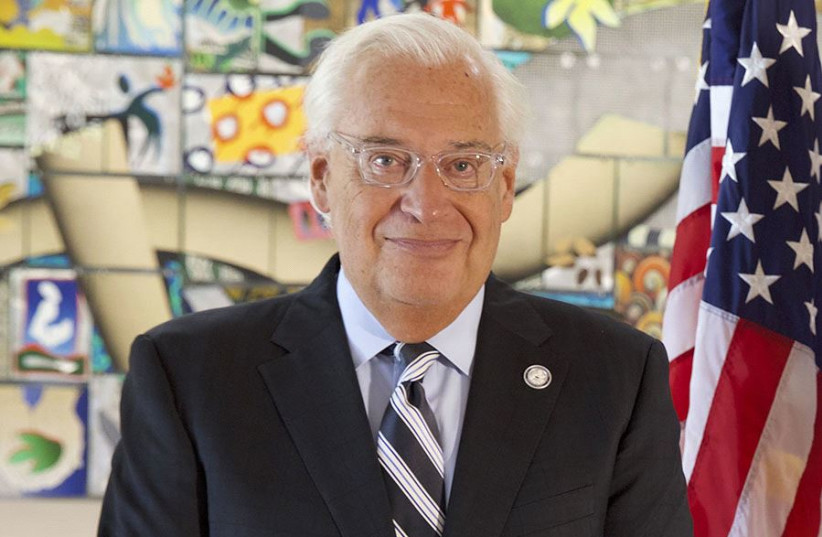Dangerous liaisons – opinion

A lot has transpired since he was ambassador. He should keep it in mind.
The US State Department could not have appointed a more suitable candidate than Dan Shapiro as “liaison to Israel” on the staff of Special Envoy to Iran Robert Malley.
Indeed, the former American ambassador to the Jewish state – whose post will entail coordinating with Israel on Tehran’s nuclear program and activity in the region – is a perfect fit for the crew in Foggy Bottom. The new administration in Washington, after all, was not only created in the image of the one led by former US president Barack Obama, but includes many of the same players.
The most notable of these, of course, is US President Joe Biden, who served as Obama’s second in command. Yet Malley, too, is among the key figures who’ve made a comeback.
As lead negotiator on the Joint Comprehensive Plan of Action – the 2015 nuclear deal with Iran from which Obama’s successor, former US president Donald Trump, withdrew in 2018 – he’s a particularly apt actor. Indeed, with Team Biden bent on reviving the JCPOA, Malley is the right man for the job.
Like Malley, Shapiro also worked out well for Obama. Previously senior director for the Middle East and North Africa on the US National Security Council, he became America’s ambassador to Israel in the summer of 2011. He resigned in January 2017, a couple of weeks before Trump’s inauguration, and was replaced by David Friedman.

THE CONTRAST between Shapiro and Friedman, both proud Jews proficient in Hebrew, was stark and immediately apparent. Shapiro, like his bosses – first US secretary of state Hillary Clinton and then her successor, John Kerry – believes in and continues to promote two central ideas.
One is that the “two-state solution” to the Palestinian-Israeli conflict is both achievable and necessary. The other is that the best, or only, way to prevent the Islamic Republic from obtaining nuclear weapons is through diplomacy.
Friedman, on the other hand, believed that these notions were false. Though fully deserving of credit for his acuity, he would have had to be in complete denial not to acknowledge the abject failure of each attempt to realize the above. You know, in the manner of his predecessor.
Yes, Shapiro was in lockstep with the pipe dreams of his superiors in Washington during the five and a half years of his tenure. Nothing unusual there. In fact, it would have been odd and inappropriate for him not to toe the line of the Obama White House and Kerry State Department.
Anyone listening to his public statements at the time could glean, however, that his views on the Middle East were in sync with those of his higher-ups, just as his social-media followers today are able to see that his opinions haven’t changed.
Unlike Malley, Shapiro is not an extreme-leftist. One advantage to the new liaison is that he will provide the perfect “liberal” camouflage for the Biden gang’s flawed agenda. Handing Afghanistan to the Taliban on a silver platter is the latest manifestation of this bumbling program.
THE ONGOING Kabul debacle, which comes on the heels and in the midst of several fruitless rounds of “negotiations” in Vienna with representatives of the mullah-led regime, makes Malley’s ideological history especially relevant and worrisome.
Immediately prior to assuming his current post, he headed the left-wing International Crisis Group. This was after serving as chief of the Middle East desk of Obama’s NSC. It’s a horrifying thought, even in retrospect, as the “conflict-resolution expert” tasked with reaching an agreement with the world’s greatest state sponsor of terrorism was an advocate of engagement with Hamas and the Muslim Brotherhood.
It was thus that radical-leftist organizations, such as Code Pink and J Street – as well as famed Israel-basher Peter Beinart – welcomed him with open arms. The ayatollahs did, too, no doubt. That he’s back in the saddle is certainly a boon to their cause: coercing the US to lift all sanctions, forfeit any and all reciprocation and revert to full appeasement mode.
They weren’t fooled by his recent Bloomberg TV interview, in which he said that America’s patience wouldn’t last indefinitely. In the first place, he refused to give a straight answer on a deadline, saying merely that Iran must have a “realistic position” and be willing to compromise. Secondly, he was purposely vague.
“The Iranian government says it still needs time, because it was just put into office and is trying to organize itself, which is understandable” he said. “But at the same time, time is passing and… we’ll have to see if Iran is seriously prepared to come back to talks and what nuclear advances it has made in the meantime. At some point, the advances will be such as to make a return to the JCPOA much less viable to the US than it would otherwise be.”
Much less viable.
That’s a nice way of saying that the administration will be forced to come up with new excuses for why it’s not ceasing all contact with Iran and telling Israel to take its operational plans for a military strike out of the proverbial drawer.
WHICH BRINGS us to Shapiro. It’s probably going to be his job to explain to Jerusalem why the military option is still off the table or how exercising it would harm US-Israel relations and chances for Middle East security.
He’s had lots of practice at this kind of diplo-speak.
At the annual Institute for National Security Studies conference in Tel Aviv in January 2016, for example, he delivered an address that requires reiterating in today’s context. On the morning before he gave his speech, a pregnant woman shopping at a grocery store in the Judean settlement of Tekoa was stabbed and seriously wounded by a Palestinian teenager. The previous evening, a mother of six was stabbed to death by another Palestinian youth in front of her 17-year-old daughter at their home in Otniel.
These attacks were part of what came to be called the “knife intifada,” though the surge in Palestinian violence against Jews that had begun four months earlier also involved rock-throwing, car-ramming, shooting and the hurling of Molotov cocktails.
The Obama administration, which Shapiro represented, had just lifted sanctions on and transferred billions of dollars to Tehran. The pathetic gestures – a reward for Iran’s having deigned to consent to the JCPOA – took place after the Iranian navy seized and held captive 10 US sailors.
To add insult to injurious humiliation, the Iranian regime demanded an apology from Washington upon the hostages’ release. Kerry not only complied, but expressed deep gratitude. In response, Iran boasted about having caused the US servicemen (and one woman) to weep, and circulated a photo of the Americans on their knees with their hands tied behind their backs.
Meanwhile, back at the INSS event, Shapiro began his remarks by condemning the “barbaric acts of terrorism” against innocent Israelis, but hastened to add, “too many attacks on Palestinians lack a vigorous investigation or response by Israeli authorities; too much vigilantism goes unchecked; and at times there seem to be two standards of adherence to the rule of law: one for Israelis and another for Palestinians.”
He went on to say that his administration was “concerned and perplexed” by Israel’s settlement policy, which raises “honest questions about Israel’s long-term intentions” regarding negotiations with the Palestinians toward a two-state solution. In fairness to Shapiro, this ridiculous mantra preceded the Abraham Accords by more than four years.
IN OTHER words, he couldn’t have known that Israel would soon be forging incredible peace deals with a number of Arab neighbors, despite Palestinian intransigence. Nor could he have imagined that such a momentous occurrence would be spurred largely by Obama’s utter capitulation to Iran, which never adhered to the terms of the already far-too-lenient JCPOA.
Shapiro would do well not to forget this. A lot has transpired since he was ambassador. He should keep it in mind.
##















